Posted On: 10/02/2016 8:14:23 PM
Post# of 72451
They are wrong as usual. Check out the following two paragraphs. One discusses market exclusivity and the second discusses NOT being disadvantaged when it comes to generic substitution:
"The 505(b)(2) applicant may qualify for 3 or 5 years of market exclusivity, depending on the extent of the change to the previously approved drug and the type of clinical data included in the NDA. This distinguishes a 505(b)(2) from an ANDA, where exclusivity can be held for only 180 days. A 505(b)(2) application may also be eligible for orphan drug or pediatric exclusivity".
"A product approved via the 505(b)(2) pathway may receive an “AB” substitutability rating in the Orange Book. Thus, from a therapeutic substitution perspective and under state formulary laws, the 505(b)(2) applicant is not disadvantaged relative to a generic (ANDA) drug"
http://regprofessional.com/resources/505(b)(2).pdf
"The 505(b)(2) applicant may qualify for 3 or 5 years of market exclusivity, depending on the extent of the change to the previously approved drug and the type of clinical data included in the NDA. This distinguishes a 505(b)(2) from an ANDA, where exclusivity can be held for only 180 days. A 505(b)(2) application may also be eligible for orphan drug or pediatric exclusivity".
"A product approved via the 505(b)(2) pathway may receive an “AB” substitutability rating in the Orange Book. Thus, from a therapeutic substitution perspective and under state formulary laws, the 505(b)(2) applicant is not disadvantaged relative to a generic (ANDA) drug"
http://regprofessional.com/resources/505(b)(2).pdf
***On 02/26/2016 at 8:33 am Scottsmith admited to posting under 5 aliases but his post was subsequently deleted. I have a screen shot and will email it to anyone interested.

